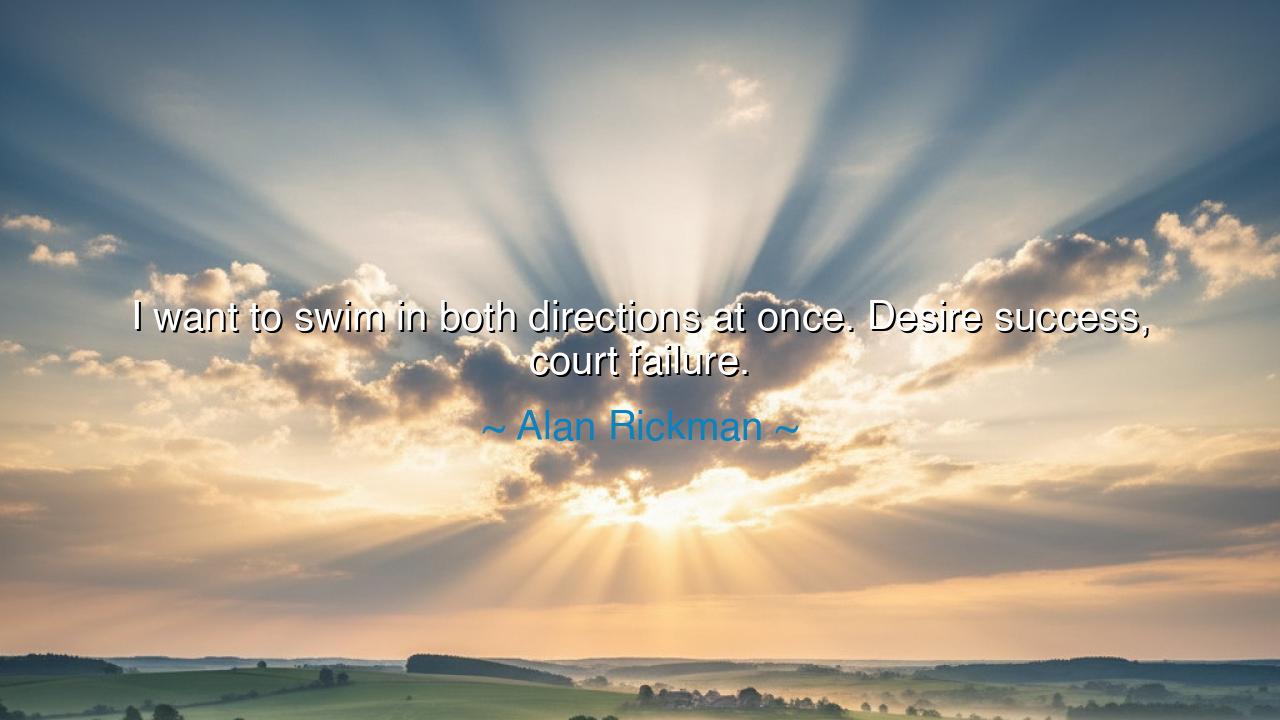
I want to swim in both directions at once. Desire success, court






Host: The café was softly illuminated by the warm glow of lights, casting gentle reflections on the polished tables. The rain outside had slowed to a soft drizzle, the sound of it mingling with the low murmur of voices around them. Jack and Jeeny sat across from each other, the weight of their conversation hanging in the air, as the world outside seemed to fade into the background.
Jeeny, her fingers tracing the rim of her cup, broke the silence with a thoughtful tone.
Jeeny: “I came across something by Alan Rickman today. He said, ‘I want to swim in both directions at once. Desire success, court failure.’ What do you think about that?”
Jack: He raised an eyebrow, the hint of a smile curling at the corner of his lips. “That’s an interesting one. Swimming in both directions at once—it’s like wanting to have everything, without fully committing to just one side. The idea of desiring success but also courting failure... it feels like a paradox, right? If you’re focused on success, how can you embrace failure?”
Host: The soft sound of the rain against the window seemed to accentuate the depth of their conversation. Jeeny’s voice, calm and steady, carried a quiet reflection as she responded.
Jeeny: “I think what Rickman is getting at is the idea of balance. We often think of success and failure as opposites, but maybe they’re not. You can’t truly appreciate success without understanding failure. The two are intertwined—they both shape who we are and where we go. Desiring success is natural, but to grow, to really push yourself, you have to be willing to risk failure. It’s about being comfortable with both possibilities, knowing that they are both part of the journey.”
Jack: “So, you’re saying it’s not about choosing one over the other, but about accepting both as part of the process? You can’t just aim for success and expect to avoid failure—it’s about embracing the struggle that comes with it?”
Jeeny: “Yes, exactly. Rickman’s idea is about embracing the journey as it is, knowing that both failure and success have value. We often avoid failure because it feels like defeat, but in reality, failure teaches us more than success ever can. It’s in the mistakes, the missteps, that we learn and grow. And once we accept that, we don’t just fear failure—we use it as part of our path to success.”
Host: The café felt almost still now, the quiet weight of their exchange hanging between them like an unspoken truth. Jack, always quick to focus on the outcomes, now seemed to consider Jeeny’s perspective with a quiet curiosity.
Jack: “I suppose when you focus only on success, you miss out on the lessons failure brings. It’s easy to think of failure as something to avoid, but maybe it’s necessary to understand the full picture. To grow, you need to be willing to face both sides of the coin.”
Jeeny: “Exactly. Failure doesn’t diminish your worth or your ability. It’s simply part of the process. You don’t become great by only chasing success—you become great by understanding the balance between the two, by being willing to step into both, knowing that they’re both part of your evolution.”
Host: The café, with its soft light and quiet hum, seemed to offer a sense of peaceful clarity, as Jack and Jeeny shared a moment of understanding. They realized that true growth didn’t come from only chasing one outcome—it came from embracing the duality of success and failure, of striving for both with the knowledge that each had a place in shaping who they were becoming. The world outside had faded, and inside, they were left with the realization that the path forward wasn’t just about reaching the goal—it was about being willing to risk, to fail, and to learn along the way.






AAdministratorAdministrator
Welcome, honored guests. Please leave a comment, we will respond soon